Limnos: Where Greek Summer Still Feels Like It...
Unspoiled beaches, authentic flavors, and a...
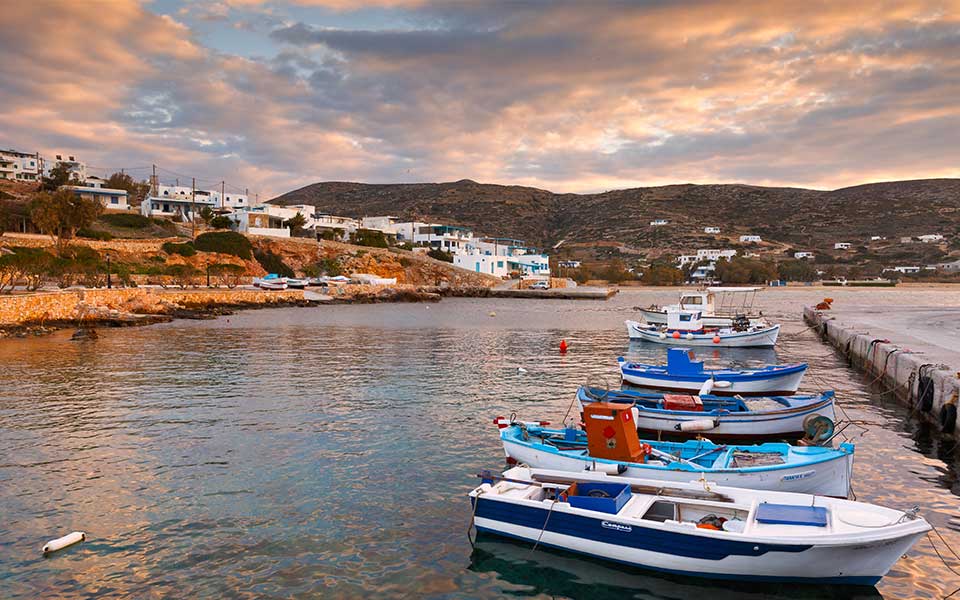
Donoussa
© Shutterstock
Mothers of children’s classmates are a new kind of relationship that appears in a woman’s life after her 30s: It’s like they mark the beginning of a second life, in which you learn not to repeat the mistakes of the first. There is no time for misunderstandings, for competition, for toxicity; you sip on your girlfriends’ love with a large existential straw.
In the last few years, I have been traveling to Donoussa along with these friends and our daughters. It has become an unwritten law for us to leave the men behind in July and travel to the island to honor our friendship, and to remind ourselves of what women can do when they are together: How effortlessly they laugh, how easily they cry after their second Aperol on the beach, how they hold each other by the hand like girls, how they go back to their teenage physical alertness that pushes them to frantically climb from Livadi to Mersini – with a small stop at Pigi.
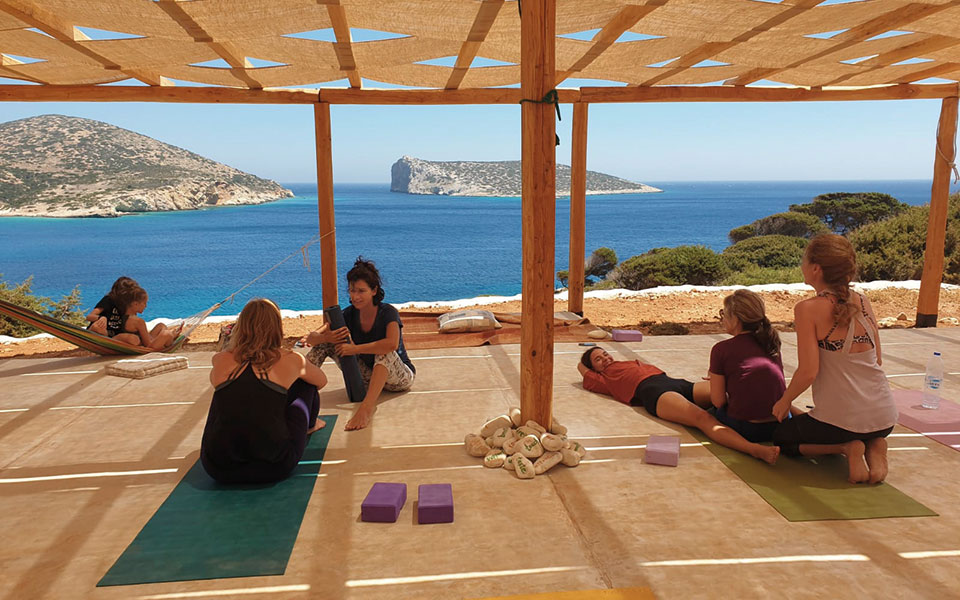
© Dimitris Tsoumplekas
This year, things were different. Our friends from Berlin went into voluntary lockdown as soon as they arrived in Athens. At that time, we still thought Covid-19 was the fruit of import and that Greek cells were endangered by foreigners only – and certainly not by the parties on Mykonos. On the day I went down to the port to greet them, I could not hold them in my arms. Instead, I gave them a headlock, as though we were 10-year-old boys. I slid behind them to hug their backs; they were still wearing their masks and tightly holding on to their luggage and children. The word “tightly” is most relevant here: there was “tightness” in the atmosphere, contraction rather than effusion; and a bittersweet melancholia. We were looking at each other more than we usually did. It seems that vision has replaced the rest of our senses since we started wearing masks. The profound silence which we had gotten addicted to during lockdown made us a little more thoughtful and down-to-earth, as well as a little graver.
We all agreed that the thing we had missed the most was the tenderness of friendship. When Sotos, a small tiger cat, came to visit us the second day on the terrace, we nearly knocked it over – and Sotos made a run for it. We spent the first week asking for double and triple the cutlery to serve salad in our plates – we who used to mix up our forks and always eat from each other’s plate. When we went up to Kalotaritissa for a yoga practice, we all sighed at the same time as we brought our knees to our chest and brought our arms around our shoulders, imitating a hug. No more acroyoga and dangerous combinations for us. Nor would we perform hugasana at the end of the practice – the relieving hugging posture invented by our teachers Zoe and Giovanni. Each of us was on her own mat and had her own antibacterial gel.
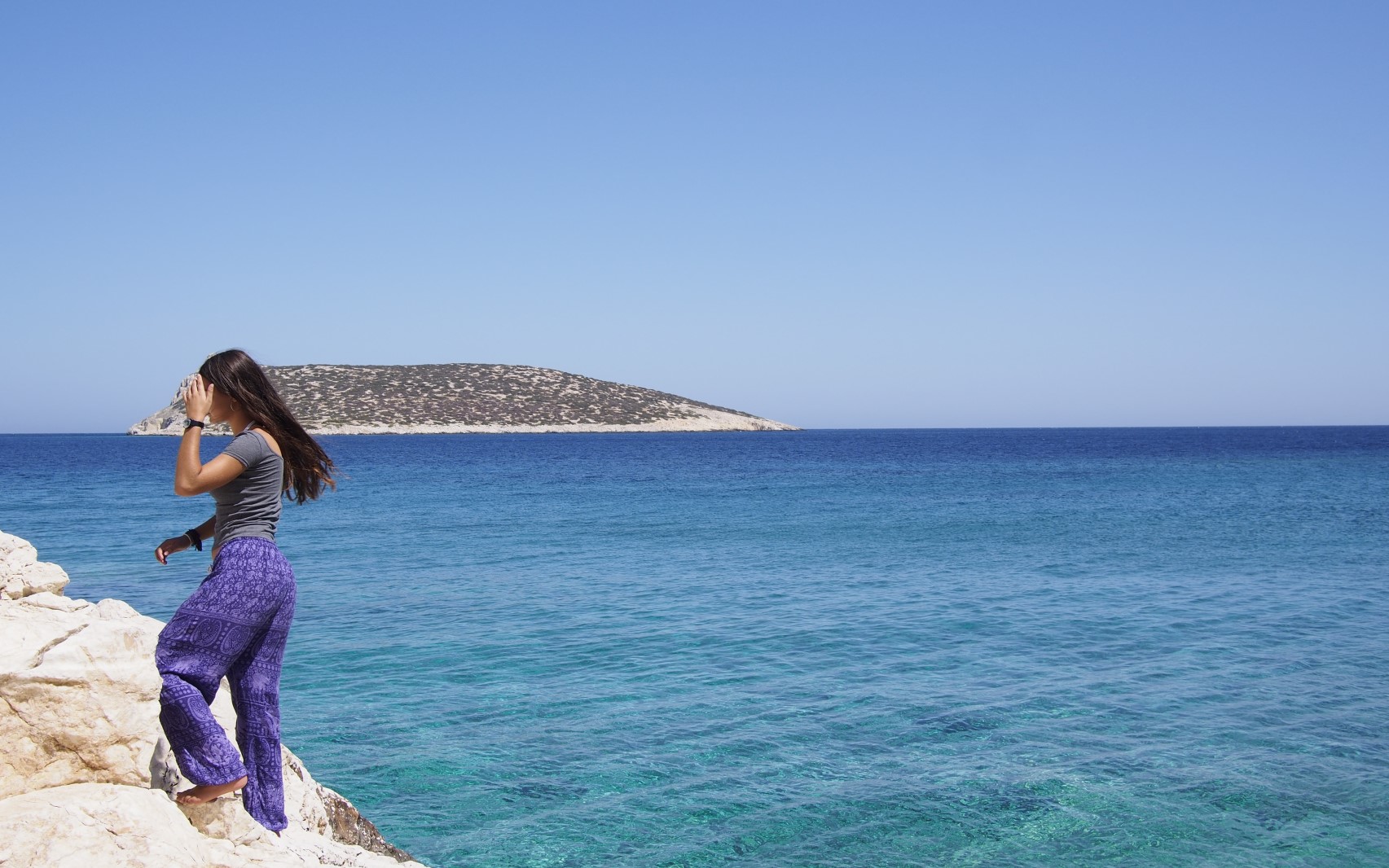
© Dimitris Tsoumplekas
Most of Donoussa’s aficionados were already there. Nicolas recounted to us how he experienced coronavirus and described the emergency situation in Milan better than any news agency. In the sea, Chiara spoke about the city of Paris in spring, which was in complete paralysis. When his shift was over, Sam dove into Agamben’s books. Efi and I took a selfie and sent it to our sweet Violeta (aka musician Nalyssa Green), who didn’t show up this year. Nireas, Marinos and Evdokia’s daughter, who were the island’s babies, had gotten bigger. Seeing them in their strollers or in someone’s arms made me think of what a mad world they were destined to grow up in.
We met the new doctor on the island when my daughter cut her eyebrow: We wore our masks again and walked up to her office. As she was cleaning the wound, she said to us: “They’re looking at me as if I were the village idiot. In their eyes, I am the eccentric who goes to the beach with her mask on.”
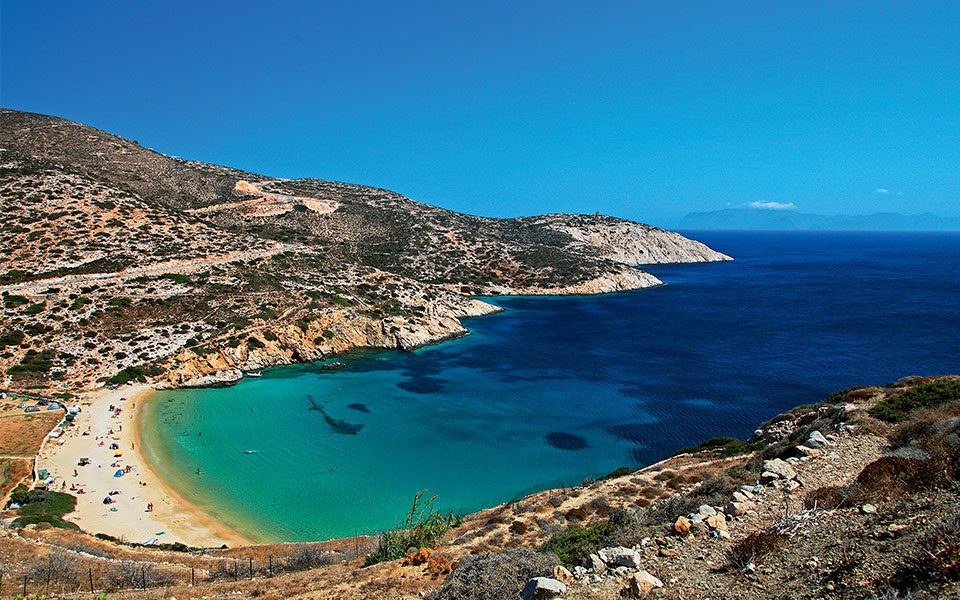
© Olga Charami
We immediately started to notice the changes on the island: The camping at Kedros was closed and Agni, with her Indian scarves, had moved to the beach for hygiene purposes. This year, she sold soap and homemade antibacterial gel instead of dresses. Without the usual campers, the island had lost a bit of its “good” madness, and Donoussa’s economy – grocery stores and supermarkets – had lost a bit of stable income. At Livadi, too, the campers who would stand in a human chain from the shore to the boat to carry over their heads the bags of excursionists arriving on the Donoussa Magissa – which stops offshore, as the waters are too shallow for the boat to reach the coast – were nowhere to be seen.
The anthropography was different. Couples showed up on the island – women in Dior and men in Polo shirts asking around for a place to eat lobster, giving the impression that they had gotten lost on their way to Schinoussa. Other groups of friends seemed to have lost their way to Koufonisi – they could not believe that Donoussa only had one bar. New faces appeared, many of which were Greeks who feared the large, tourist-trampled islands. Most Italians and Germans had canceled their bookings.
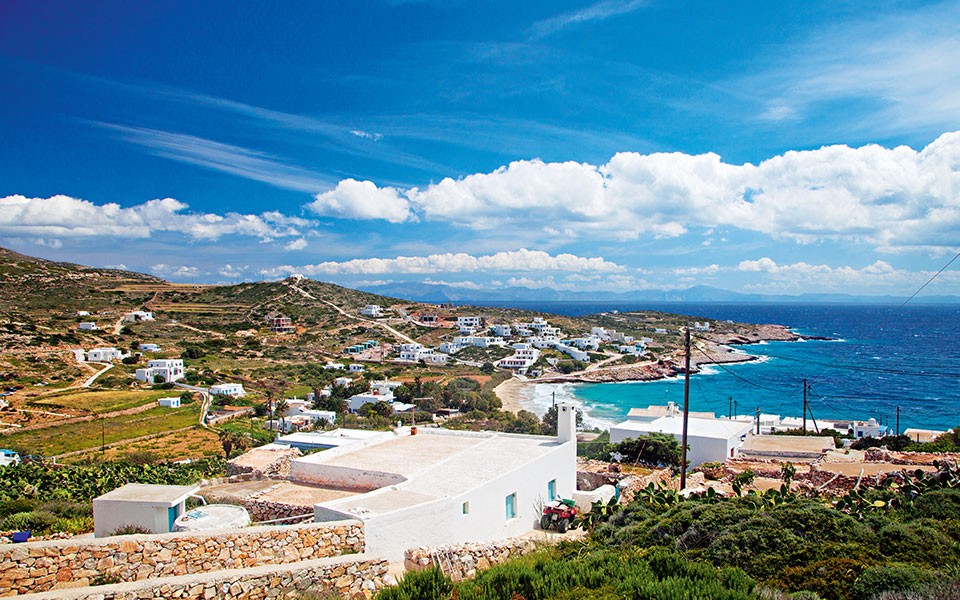
A view of Stavros, the main village and port of Donoussa.
© Olga Charami
Every morning when we went down to Stavros’, we could not help but smile at the sign that greeted us in front the first bar that we had discovered and loved on the island: Its name was, and remains, Corona Borealis. In the evenings, Kedros, without the usual live music, felt melancholic. My daughter’s friends mourned the end of outdoor parties. They described the pre-Covid nights at Kedros to the newcomers. On the other hand, the stars seemed to shine brighter without the party lights; and Gambas did his best setting up an improvised bar next to the bench and introducing the idea of the afternoon aperitif. As a result, we started drinking earlier.
We didn’t meet any know-it-all conspiracy theorists, except for one waitress at a restaurant in the port who told us with great confidence that the coronavirus didn’t exist and that the media was only broadcasting this news so that the hospitals would fill their pockets with the increase in patient admissions. Other than that, most establishment owners were cautious; they wore their masks and respected social distancing. We had some of the most pleasant evenings at Avli, Ampelaki, Iliovasilema and Tzi Tzi. We could see the smiles of our caring and mindful hosts behind their masks. We were inspired by all their attitudes. My friends who work in visual arts suggested that we create the “Women of Donoussa” group, which we inaugurated with a social distancing performance where we laid our towels down at a distance – to be honest, we rather waved them in the air.

Sunset at the famous – and timely – Corona Borealis.
© Dimitris Tsoumplekas
We gradually became braver; in the second week, we started snacking on tomatoes directly from the Greek salad bowl, and we brought our beach mats a little closer. The sun was doing what it did best: It softened our bodies, chased away the fear of disease, and grazed our tummies. The stupid song that was stuck in my head when I washed off my bathing suit or sliced a watermelon went like this:
I got my hands on your body
So tell me what you want me to do
I can be good or be naughty
Ain’t nobody love you like I do.
It was no coincidence that all day long, I repeated a song like a mantra in my head about hands, bodies and erotic promises – it was merely heroic and mournful chanting against the coronavirus.
I had been taking notes for a science fiction story (or at least it sounded like one) where people do not kiss or touch each other. As touch fades, human fingers either wind up in hard hooves like those of horses, or they are joined together by membranes like those of bats. I gathered phrases that call up on touch: pinch me, I must be dreaming/touch me here to check my temperature/take my pulse/feel how soft this fabric is/hug me, I’m cold.
What we touch is more reliable than what we see. As Descartes said, the sense of touch is the least deceptive of all. From his perspective, we truly lived the summer of complete illusion. The only things we touched were the sand, our cutlery and our children’s hair. Now that I think about it, we were relatively lucky: It was still July, and the plot of the last days had not unfolded yet. Still, as if we already knew what would happen, we binged on sun, stocking up on energy and light for the harsh winter lying ahead.
Unspoiled beaches, authentic flavors, and a...
New excavations shed light on an...
From traditional dances and global rhythms...
The attention of the global fishing...